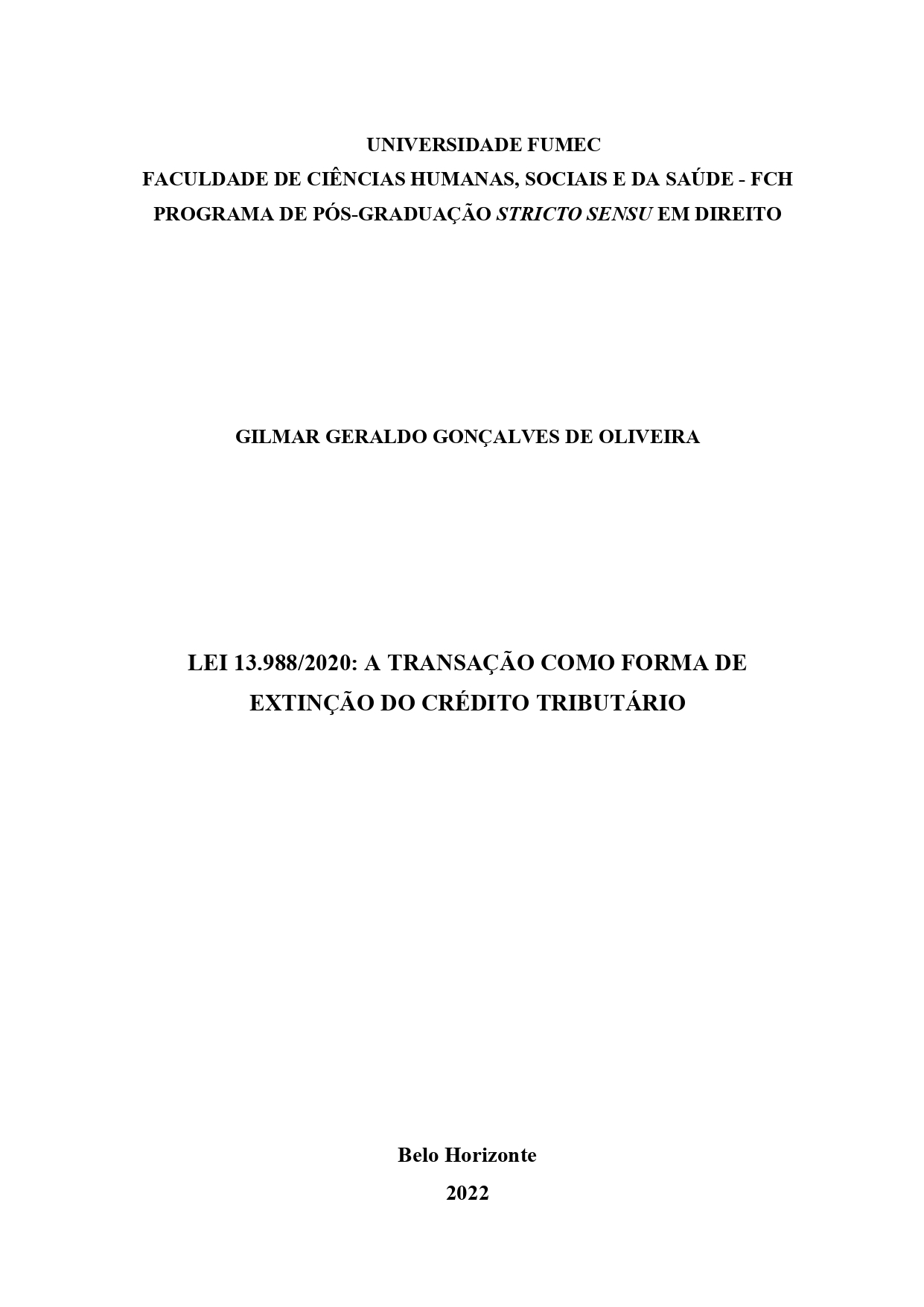Lei 13.988/2020: a transação como forma de extinção do crédito tributário

Visualizar/
Data
2022Autor
Oliveira, Gilmar Geraldo Gonçalves de
xmlui.mirage2.itemSummaryView.MetaData
Mostrar registro completoResumo
A Constituição da República Federativa do Brasil (CRFB/1988), ao assegurar novos direitos e
garantias individuais, proporcionou uma explosão de demandas, especialmente no âmbito
tributário, para qual a estrutura disponível no Poder Judiciário não estava preparada. As
execuções fiscais são as maiores responsáveis pela elevada taxa de congestionamento do
judiciário, demonstrando a ineficiência do modelo tradicional de recuperação do crédito fiscal.
Desse modo, vem ganhando forças a criação de meios alternativos de solução de conflitos no
âmbito tributário, dentre os quais se destaca a transação, sobretudo após a edição da Medida
Provisória (MP) 899/2019, convertida na Lei 13.988/2020 (BRASIL, 2019; BRASIL, 2020). O
presente trabalho tem por tema problema analisar se a transação tributária, da forma
regulamentada pela Lei 13.988/2020, encontra-se de acordo com as regras preconizadas no
Código Tributário Nacional (CTN), sobretudo no que tange ao momento da extinção do crédito
tributário. Para tanto, analisar-se-á o instituto da transação no ordenamento jurídico brasileiro,
desde da sua origem no Direito Civil e as disposições contidas nos artigos 156, III e 171 do
CTN, mormente os elementos formadores. Ainda, observar-se-ão as experiências identificadas
no Direito Comparado, especialmente nos Estados Unidos da América, na Itália e na Espanha
para demonstrar que os ordenamentos jurídicos estrangeiros, há tempos, se valem do consenso
para solução de conflitos em matéria tributária. Utilizar-se-á da pesquisa bibliográfica por meio
dos métodos dedutivo e comparativo, além de pesquisa de dados para, em conclusão, afirmar
que a transação, por si só, extingue o crédito tributário, sobretudo a parcela do crédito que a
administração pública abriu mão, independente do cumprimento integral das obrigações
pactuadas. The Constitution of the Federative Republic of Brazil (CRFB/1988), by ensuring new rights
and individual guarantees, provided an explosion of demands, especially in the tax area, for
which the available structure in the Judiciary was not prepared. Tax executions are the most
responsible for the high rate of congestion in the judiciary, demonstrating the inefficiency of
the traditional model of tax credit recovery. Thus, the creation of alternative means of conflict
resolution in the tax area, among which the transaction stands out, especially after the issuance
of Provisional Measure (MP) 899/2019, converted into Law 13,988/2020 (BRAZIL, 2019;
BRAZIL, 2020). The problem of this paper is to analyze whether the tax transaction, as
regulated by Law 13988/2020, is in accordance with the rules set forth in the National Tax Code
(CTN), especially with regard to the moment of extinction of the tax credit. To this end, we will
analyze the transaction institute in the Brazilian legal system, since its origin in Civil Law and
the provisions contained in articles 156, III and 171 of the CTN, especially the forming
elements. Furthermore, the experiences identified in Comparative Law will be observed,
especially in the United States of America, Italy and Spain, in order to demonstrate that foreign
legal systems have long been using consensus to solve conflicts in tax matters. The
bibliographical research will be used, using the deductive and comparative methods, as well as
data research, to conclude that the transaction itself extinguishes the tax credit, especially the
portion of the credit that the government gave up, regardless of full compliance with the agreed
obligations.
